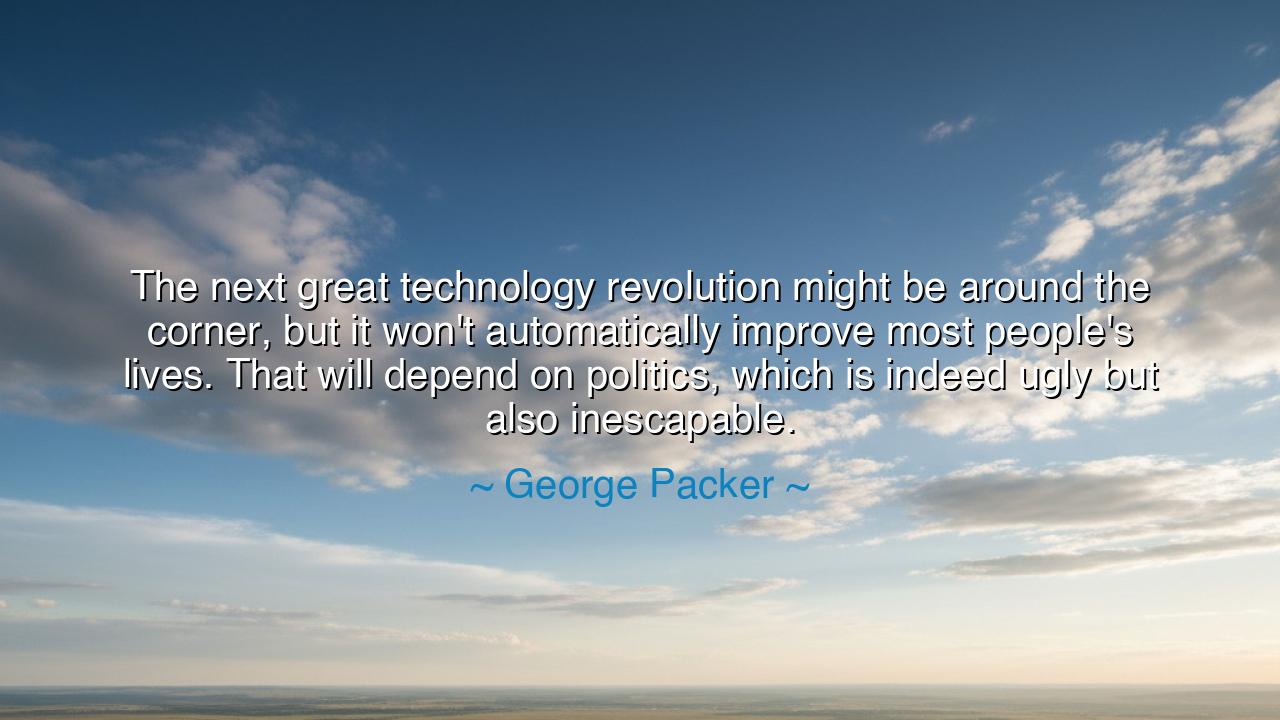
The next great technology revolution might be around the corner
The next great technology revolution might be around the corner, but it won't automatically improve most people's lives. That will depend on politics, which is indeed ugly but also inescapable.






Hear the words of George Packer: “The next great technology revolution might be around the corner, but it won’t automatically improve most people’s lives. That will depend on politics, which is indeed ugly but also inescapable.” In this saying lies a profound reminder that progress is not merely born of invention, but of governance, that the brilliance of machines and the power of new tools mean little unless guided by the will of society and the decisions of rulers. For technology may alter the shape of the world, but only politics decides how its fruits are shared.
The ancients knew this truth well. When the printing press was invented, it carried the potential to enlighten every corner of Europe. Yet its power unleashed not only knowledge but also war, reformation, and upheaval. It was not the press itself that brought freedom or destruction, but the way kings, priests, and peoples wielded it. Some used it to spread wisdom, others to fan flames of division. Thus, the gift of invention became a double-edged sword, and politics chose which edge would cut deepest.
Packer warns us not to fall into the illusion of inevitability. Each technology revolution, from the steam engine to electricity, from the computer to the internet, has carried the hope of emancipation. Yet the results have never been equal. The Industrial Revolution lifted some into wealth while casting others into misery, their labor exploited in the factories of the powerful. It was only through struggle—through laws, unions, reforms, and resistance—that balance was slowly restored. Without the hand of politics, technology serves the few; with it, it may serve the many.
Consider the story of electricity in the nineteenth century. At first, its wonders lit only the mansions of the wealthy, a dazzling display of luxury. But through decades of struggle, through the building of grids, through policy and governance, it spread to farms, villages, and cities alike. Electricity did not democratize itself; it was politics that carried its light into every household. Here we see Packer’s wisdom proven: invention provides the possibility, but leadership and governance decide the reach.
And yet, the words carry not despair but challenge. Yes, politics is “ugly”—filled with compromise, corruption, and struggle—but it is also the arena where the fate of progress is decided. To disdain it, to turn away from it in disgust, is to abandon the tools of justice to those who would misuse them. For as long as humans live together, politics will remain inescapable. The choice is not whether it exists, but whether we will engage it with courage or leave it to the ambitions of the selfish.
The teaching is this: do not trust blindly that technology will save you. Look instead to how it is governed, distributed, and guided. For machines have no conscience, but men do. A great invention in the wrong hands may enslave rather than free, divide rather than unite. Only vigilance, participation, and just leadership can ensure that revolutions of the mind become revolutions of the heart and spirit as well.
Practical wisdom follows. In your own time, do not turn away from the “ugliness” of politics, but engage it, for in its rough halls the destiny of every invention is decided. Ask: who controls this technology? Who benefits from it? Who is left behind? Support leaders who strive to share the fruits of progress widely, and hold accountable those who would hoard them. And in your own circle, act justly with the tools you have, ensuring that your gifts uplift rather than oppress.
Thus, let George Packer’s words be remembered as a warning and a guide. The technology revolution may come swiftly, but only with just politics will it serve humanity. To despair of politics is to surrender the future; to embrace it, with all its flaws, is to take up the burden of shaping progress for the good of all. For though invention creates the light, it is politics that decides whether it shines on the palace alone, or on the whole of humankind.






AAdministratorAdministrator
Welcome, honored guests. Please leave a comment, we will respond soon